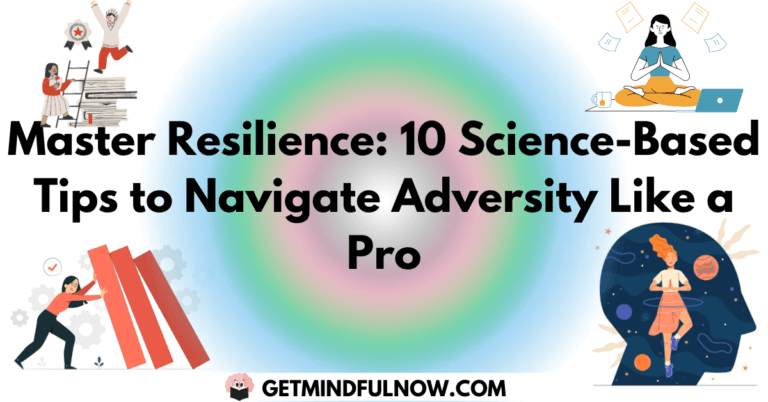Life isn’t just a smooth road; it’s a series of twists, turns, and unexpected detours. We’ve all faced moments when the weight of challenges felt unbearable—a health scare, a career setback, or even the loss of a loved one. In those moments, resilience becomes the defining factor between feeling overwhelmed and finding the strength to adapt and grow.

But here’s the truth: resilience isn’t something you’re born with; it’s a skill you can cultivate. And it’s more than just “bouncing back.” True resilience is about evolving through adversity, building emotional strength, and rewiring your brain to handle life’s storms with grace and purpose.
Science tells us that resilience is deeply rooted in the brain’s ability to adapt. Studies have shown that resilient individuals have stronger neural connections that help them regulate emotions, stay focused under pressure, and recover from setbacks faster. On the flip side, a lack of resilience can make even small challenges feel insurmountable, triggering fear, anxiety, and an overactive stress response.
The good news? You can train your brain and mind to become more resilient. In this blog, I’ll walk you through proven, science-backed strategies to boost resilience, along with the fascinating neuroscience behind how it works. Whether you’re struggling with daily stress or navigating life’s toughest moments, these insights and tools will help you not only survive but thrive.
Let’s dive in together!
The Science of Resilience: How Your Brain Adapts to Adversity
Resilience isn’t just a personality trait—it’s a skill deeply rooted in the brain’s incredible ability to adapt and grow. The neuroscience of resilience sheds light on how the brain responds to stress, how it rewires itself for strength, and what happens when resilience is low.
How Resilience Works in the Brain
At the core of resilience lies neuroplasticity—the brain’s ability to rewire and adapt in response to experiences. When faced with challenges, several key brain regions come into play:
- Prefrontal Cortex: This part of the brain governs rational thinking, decision-making, and emotional regulation. It helps you assess situations, weigh options, and respond thoughtfully rather than react impulsively.
- Amygdala: Known as the brain’s “alarm system,” the amygdala processes fear and triggers stress responses. A resilient brain has a balanced amygdala-prefrontal cortex connection, allowing you to manage fear and remain composed under pressure.
- Hippocampus: Vital for memory and learning, the hippocampus helps you contextualize experiences and learn from challenges. A well-functioning hippocampus reduces the risk of overgeneralizing negative events.
Resilient individuals exhibit stronger neural connections between these areas, enabling them to recover faster from stress, adapt to change, and maintain emotional balance.
What Happens When Resilience Is Low?
When resilience is lacking, the brain’s stress-response system can become overactive, leading to:
- Heightened Amygdala Activity: Chronic stress can overstimulate the amygdala, resulting in persistent fear, anxiety, hating others, or a tendency to overreact to minor stressors.
- Weakened Prefrontal Cortex Control: When the prefrontal cortex is less active, it becomes harder to regulate emotions effectively. This can result in more impulsive reactions rather than logical, thoughtful responses.
- Reduced Hippocampal Volume: Prolonged stress has been linked to shrinkage of the hippocampus, impairing memory and increasing feelings of helplessness.
This imbalance can create a cycle where stress becomes overwhelming, making it harder to bounce back or view challenges with perspective.
The good news? Resilience is a skill anyone can develop. Here are 10 science-backed strategies to help you build inner strength, regain balance, and move forward with confidence.
1. Foster Strong Connections
We’re wired for connection. Supportive relationships are among the strongest predictors of resilience, providing comfort, perspective, and encouragement during tough times.
Early Life Stress and Resilience:
A groundbreaking study in PNAS (2020) highlighted the role of supportive relationships in buffering against the long-term effects of early adversity. Participants with strong social support networks showed healthier brain responses to stress compared to those without.
How to Build Supportive Connections:
- Call a friend or family member just to talk.
- Join a group or community that aligns with your interests.
- Offer support to others—sometimes giving creates stronger bonds.
Studies show that even brief, meaningful interactions can lower cortisol, the stress hormone, and improve emotional well-being.
2. Embrace a Growth Mindset
A growth mindset transforms setbacks into stepping stones. Instead of seeing challenges as insurmountable, view them as opportunities to learn and grow.
Resilience and Brain Plasticity:
A 2017 study published in Nature Human Behaviour found that resilient individuals show higher levels of neuroplasticity. This adaptability allows their brains to reorganize after stress, fostering quicker emotional recovery and problem-solving.
How to Start:
- Reframe failures as lessons: “This didn’t work, but now I know what to try next.”
- Celebrate small wins to remind yourself of progress.
- Shift your self-talk: “This is hard, but I’m figuring it out.”
3. Practice Daily Mindfulness
Mindfulness helps you stay present, reducing worry about the future or regrets about the past. It increases self-awareness and helps you respond thoughtfully rather than react impulsively.
Mindfulness and Resilience:
Research from the Journal of Cognitive Enhancement (2018) demonstrated that mindfulness practices increase gray matter density in the prefrontal cortex and hippocampus. This enhances emotional regulation and reduces stress, making mindfulness a powerful tool for resilience.
Easy Mindfulness Practices:
- Dedicate 5–10 minutes to breathing exercises or a body scan.
- Use apps like Calm or Headspace for guided mental rehearsals.
- Take mindful pauses during the day—just a few deep breaths can shift your perspective.
4. Cultivate Emotional Awareness
Resilience isn’t about suppressing emotions; it’s about understanding and managing them. Emotional awareness allows you to process feelings constructively and maintain balance in stressful situations.
Study: Emotional Awareness and Resilience in High-Stress Occupations
A 2019 study in Frontiers in Psychology found that individuals who regularly labeled and processed their emotions demonstrated significantly higher resilience levels, particularly in high-stress jobs like healthcare and law enforcement. Emotional awareness was linked to better stress management and reduced burnout.
Steps to Strengthen Emotional Awareness:
- Name your emotions: “I feel overwhelmed because…”
- Practice journaling to process feelings.
- Try deep breathing or grounding techniques during emotional highs.
5. Take Care of Your Body
Your physical health is a foundation for mental resilience. Exercise, good nutrition, and sleep are powerful tools for managing stress and building emotional strength.
Study: Physical Activity and Emotional Resilience: The Role of Endorphins
Research published in Psychosomatic Medicine (2018) confirmed that regular physical activity increases the production of endorphins, dopamine, and serotonin—neurotransmitters that elevate mood and reduce stress. This creates a foundation for greater mental resilience.
Actionable Tips:
- Aim for 30 minutes of exercise most days—it releases endorphins and boosts mood.
- Prioritize nutrient-rich foods for steady energy and mental clarity.
- Stick to a consistent sleep routine to let your brain process emotions and recover.
6. Focus on Gratitude
Gratitude shifts your perspective, helping you see what’s going right instead of dwelling on what’s wrong. It fosters optimism and strengthens relationships.
Study: The Neuroscience of Gratitude and Well-Being
A 2015 study from NeuroImage revealed that practicing gratitude activates the brain’s reward system, specifically the ventromedial prefrontal cortex. Participants who kept a gratitude journal for two weeks showed lasting increases in emotional well-being and resilience.
Study: Gratitude as a Buffer Against Trauma
Published in The Journal of Positive Psychology (2018), this research found that trauma survivors who practiced gratitude experienced lower levels of PTSD symptoms and greater emotional recovery. Gratitude provided a protective psychological buffer.
How to Practice Gratitude:
- Write down three things you’re grateful for each day.
- Reflect on moments when someone’s kindness helped you.
- Express appreciation directly—tell someone why they matter to you.
7. Build Stress Management Skills
Stress is inevitable, but how you respond to it determines its impact. Resilient people use healthy coping mechanisms to manage and reduce stress.
Study: Effectiveness of Progressive Muscle Relaxation (PMR)
A meta-analysis published in Behaviour Research and Therapy (2020) demonstrated that PMR reduced physiological stress markers, such as cortisol levels, by over 25%. This technique directly enhanced individuals’ capacity to manage stress and maintain resilience.
Study: Mindfulness-Based Stress Reduction (MBSR) and Resilience
A 2016 study in Mindfulness found that participants who completed an 8-week MBSR program showed significant improvements in their ability to manage stress and maintain composure under pressure. Brain scans revealed stronger prefrontal cortex activity after the program.
Techniques to Try:
- Practice progressive muscle relaxation (PMR).
- Take regular breaks for short meditation to recharge, even for just a few minutes.
- Avoid harmful coping strategies like excessive alcohol or avoidance.
8. Accept and Adapt to Change
Change can be intimidating, but it’s also an opportunity for growth. Resilient people learn to adapt rather than resist, finding new paths forward when circumstances shift.
Study: Neuroplasticity and Adaptation to Change
Research published in Nature Communications (2020) demonstrated that the brain’s neuroplasticity is enhanced when individuals embrace change rather than resist it. Participants who practiced reframing challenges showed increased connectivity between the prefrontal cortex and hippocampus.
How to Embrace Change:
- Focus on what you can control and let go of what you can’t.
- Reflect on past challenges you’ve successfully navigated.
- Treat change as a chance to innovate or pivot toward new opportunities.
9. Strengthen Your Sense of Purpose
A clear purpose gives you direction, especially in challenging times. Knowing what matters to you provides motivation to persevere.
Study: Purpose in Life as a Predictor of Resilience
A landmark study in The Journal of Aging and Health (2017) found that individuals with a strong sense of purpose exhibited greater resilience across all age groups. Purpose was linked to reduced stress, improved coping skills, and lower levels of inflammation in the body.
Study: Volunteering and Psychological Resilience
Published in Social Science & Medicine (2019), this research revealed that people engaged in meaningful work or volunteer activities reported higher levels of resilience. Helping others activated brain regions associated with reward and motivation, reinforcing their sense of purpose.
Ways to Clarify Purpose:
- Reflect on what brings meaning to your life—relationships, passions, or goals.
- Volunteer for causes that resonate with your values.
- Set small, purpose-driven goals to create momentum.
10. Seek Professional Help When Needed
Sometimes, resilience requires support. Whether it’s therapy, counseling, or coaching, professional guidance can provide personalized strategies to help you move forward.
When to Seek Help:
- You feel stuck despite trying these techniques.
- Stress is interfering with your daily life.
- You want tailored tools to navigate a specific challenge.
Final Thoughts: Resilience is a Lifelong Journey
Building resilience isn’t about avoiding struggle; it’s about learning to navigate it with strength, courage, and hope. Start small—choose one or two strategies from this list and integrate them into your life. Celebrate every bit of progress, no matter how small.
Resilience grows with each step you take. You’re not just surviving—you’re becoming stronger, more adaptable, and ready to thrive.
Which of these strategies will you try today? Let me know in the comments!








